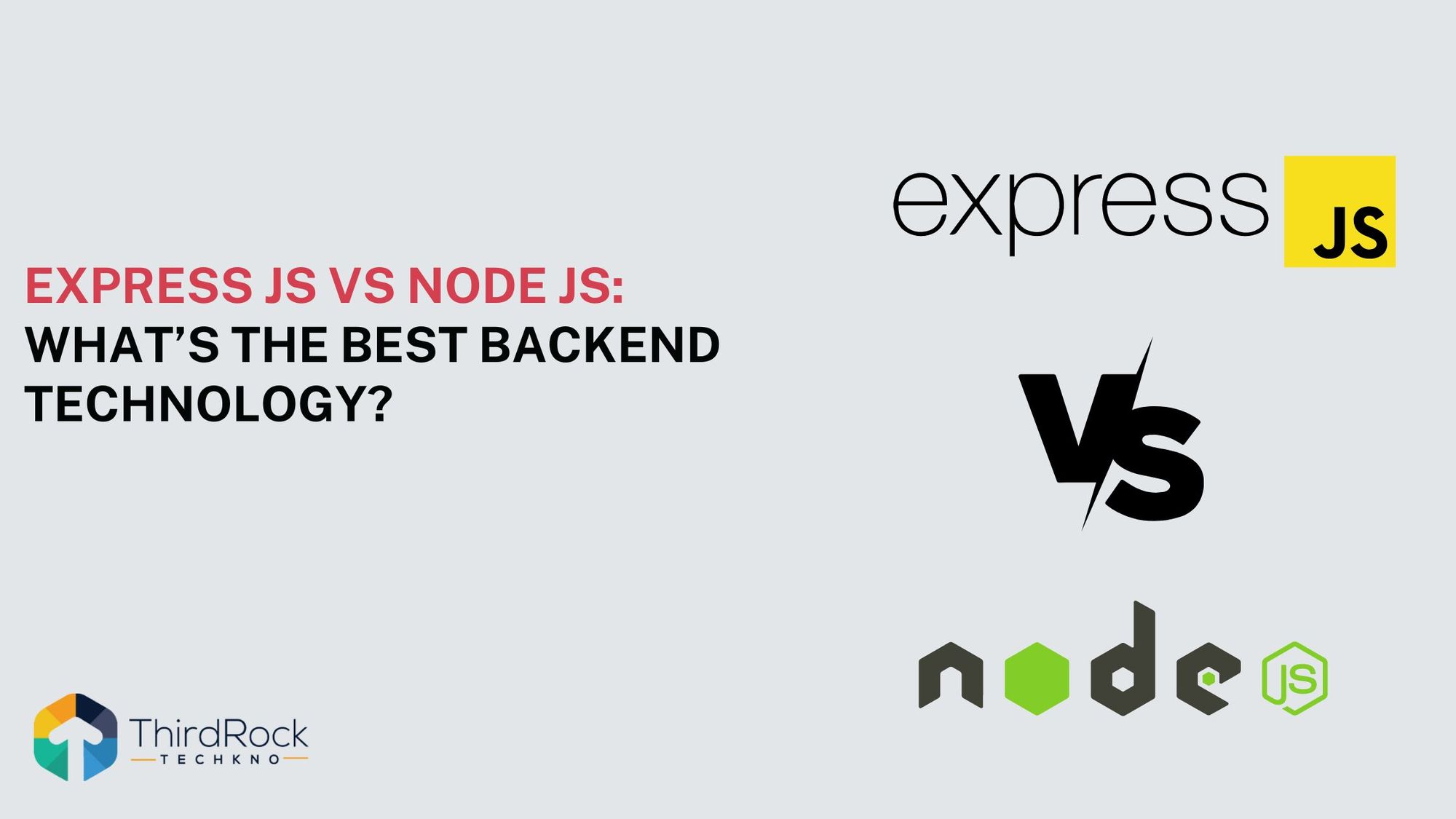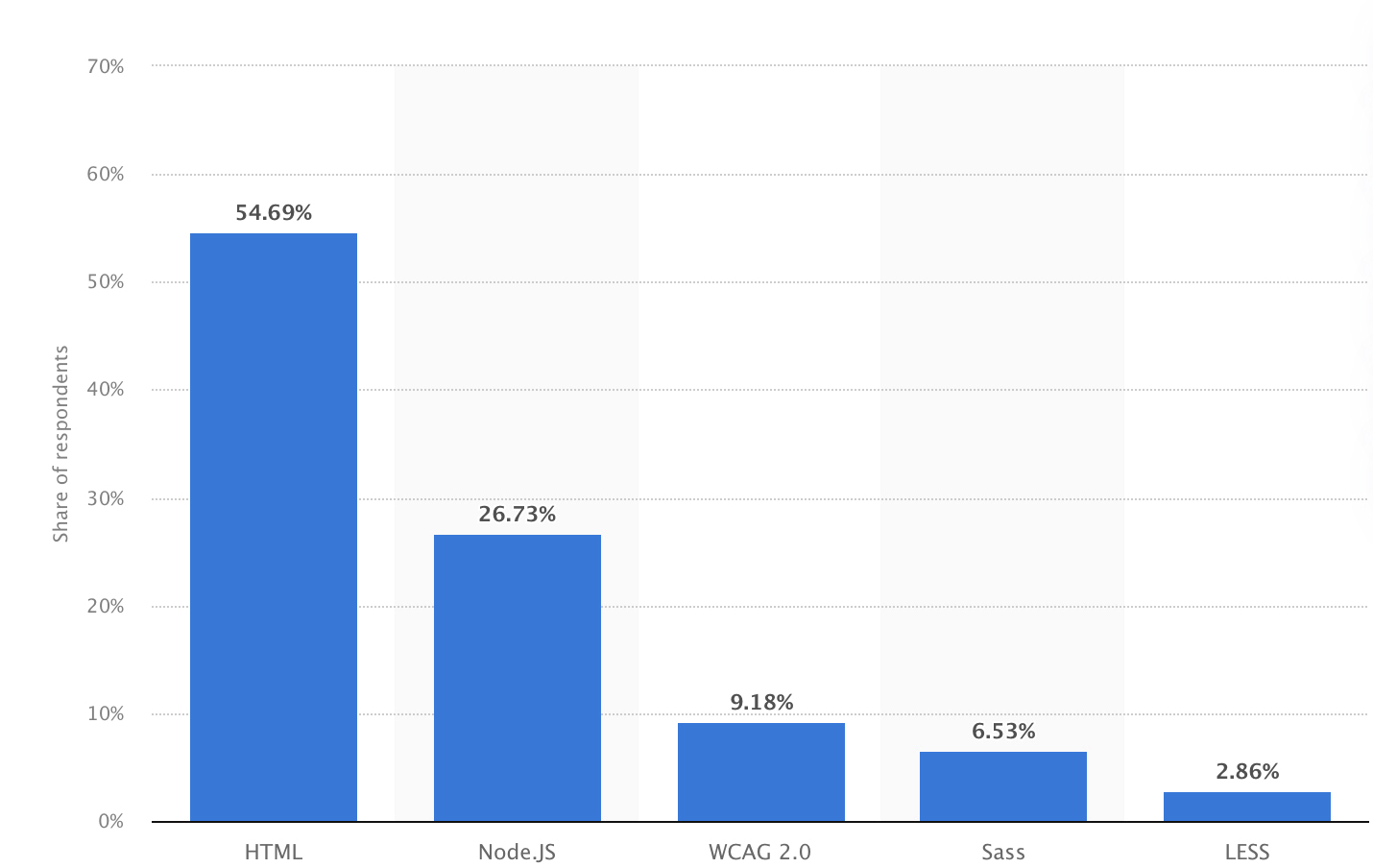
Hold your breath and sit tight, as we’re setting out to declare the one-true winner for the most popular technologies for back-end development. Yes, you guessed it right! It’s the ultimate battle between Express js vs Node js. But the all-important question - which one is it? Let's jump in and find out.
Introduction
Today, all you need is an all-inclusive, modern, and scalable backend technology that performs efficiently and gives a tough fight to your competitors.
In the world of web development, JavaScript is undoubtedly the champion. It’s the most popular and versatile programming language. While its power can be found on the client side, it has also gained prominence on the server side thanks to our protagonist's Node js and Express js.
Popular is an understatement when it comes to NodeJS and Express JS both of which feature great performance, robust support (more than 1 million downloads), and a dazzling list of features.
Let’s find out more about web development with node and express leveraging the javascript stack.

What is Node JS? – A Quick Overview
Node.js is a JavaScript runtime built on the Google Chrome V8 engine. An open-source, cross-platform application framework that was designed to run on single-threaded processes and accomplish real-time tasks. The JavaScript engine built on the platform makes it possible to build high-performance apps that have an express response time.
The idea behind Node.js was to create an open-source platform that allows you to write your app in JavaScript without having to go through the hassle of compilation and installation. Basically, it acts as an "interface" for your nodes which helps you consume server-side APIs from within your scripts.
Features of Node JS
✅ Lightweight and effective
✅ Supremely adaptable & versatile
✅ Zero buffering
✅Event-driven
✅Uses non-blocking I/O model
The popularity of Node JS in the Development Kingdom
🔥Node.js is used by at least 30 million websites.
🔥Over the last few years, Node.js has had a positive impact on developer productivity and business operations.
🔥 As per the Stack Overflow reported in 2021, Node.js took 6th position on the list of the most widely used web technologies.
🔥In another survey conducted by Statista, Node.js ranked second, being preferred by 26.73 percent of respondents.

Use Cases of Node JS
✅Server Side rendering for Single Page Applications (SPAs)
✅Data Streaming Apps
✅Chatbots
✅Video & audio conferencing apps
✅ IoT-based applications
✅Rest APIs
✅Real-time applications
✅ Online Gaming
✅Drawing/editing apps,
✅Backends and servers
Apps Built With Node JS that Prove Its Awesomeness
- Some of the classic examples of companies using Node.js are Amazon, Netflix, eBay, Reddit, LinkedIn, Tumblr, and PayPal.
- Netflix noticed a significant reduction in startup time and experienced spectacular results when it came to performance.
- Fun Fact? Node.js powers the backend of some of your favorite ecommerce websites including the likes of AliExpress and eBay.
- The payment giant PayPal witnessed a mammoth decrease of 35% in average response time after the change from Java to Node.js.
Is Node JS used for frontend or backend?
And how to connect frontend and backend in Node.js? These are a few questions that come to the minds of many. Let’s dig deep and figure it out.
Node.js is 100% a versatile tool when it comes to web development. It’s used for both front-end and back-end development, but it has the ability to fulfill these roles whenever necessary. This is why so many CTOs and business owners love working with Node.js. It’s not limited to just dealing with websites or apps though — you can put Node.js to good use in areas like automation, data storage and analysis, real-time communication, and various other areas of IT and technology
Since it's built on top of native JavaScript, its task is to look after the backend while extensions like React and Angular step in to handle the frontend. To answer the question to connect the frontend and backend in Node.js you simply need to create an Express backend and create a React frontend. Next, prepare to fetch the data from the backend and show it on the React app, and voila you’re done.

What is Express JS? – A Quick Overview
Express JS or express is an open-source framework that was built especially for Node JS. It's used to build web applications, APIs, and other services on top of the MEAN stack. The Express framework allows third-party integrations with many different packages/features that can be easily customized.
Express is by far one of the most popular Node.js frameworks. It is developed by the same team that created JSON, making it a robust option for any application needing a lot of routes and data processing logic on the server-side.
Features of Express JS
✅Faster server-side development
✅Highly advanced routing mechanism
✅Templating
✅Debugging
✅Easy error fixing
The popularity of Express js in the Development Kingdom
🔥A study showed that Express ranked no.9 in market position for Web Application Frameworks.
🔥Express was awarded 6th most popular in .io in the Frameworks category.
🔥It also bagged the 14th position among the most popular in the Top 10k sites in Frameworks category.
🔥Express secured its place as the 4th most popular in .me in Frameworks category.

Use Cases of Express
✅Single Page Applications (SPAs)
✅Multi Page Applications
✅Hybrid Web Applications
✅Reusable Application
✅Middleware Applications
✅RESTful APIs
✅Enterprise web applications
✅eCommerce web applications
Apps Built With Express that Prove Its Awesomeness
- Popular applications that came to life thanks to Express JS include the likes of mega giants such as Twitter, TrustPilot, Practo, Wix, Accuweather, Plaid.
- Did you know? Express JS drives your favorite cab booking service Uber. It's base web server, Bedrock is built on top of Express JS.
- Back in 2017, Twitter launched Twitter Lite with Express JS, a Progressive Web App that worked faster and occupied less space.
- Accenture, a global IT company’s website uses Express in its server-side rendering.
Let’s Identify the Pros & Cons for Express JS Vs Node JS
Node JS Pros & Cons
✔️Fast, flexible, lightweight, speed, scalable & efficient are words that perfectly define Node JS.
✔️An easy learning curve, straightforward application & robust features.
✔️Uses the non-blocking I/O mechanism lets you handle multiple requests simultaneously.
✔️Can be used on both frontend and backend that leads to lower development costs
✔️Offers tremendous support for Real-time applications.
❌Uses asynchronous programming model which makes it difficult for developers to understand code.
❌Lacks support for certain important tools which can then be fulfilled using frameworks such as Express.
❌Node Js and heavy computing apps don't pair well.
❌Lack of consistency and frequent API changes require constant updates from developers.
❌Owing to its unopinionated nature of working, development takes more time.

Express Pros & Cons
✔️Super quick, adaptable, and straightforward are words that perfectly define Express JS.
✔️Unopinionated framework = lesser development time.
✔️A minimalist framework with easy installation and setup.
✔️Express.js provides controllers and powerful routing APIs.
✔️Unlocks a whole new level of features in addition to the existing functions of Node.js.
❌Use of middleware functions can be difficult to understand and tricky to apply.
❌Lack of a proper structure such as an inbuilt ORM system.
Express JS vs Node JS: Performance Comparison
Node JS
Node.JS is a server-side platform that allows the creation of fast, scalable network applications without having to write any code. NodeJS makes web application development easy by making use of an event-driven, non-blocking I/O model which increases the performance of servers. Node is known for its ability to process multiple requests concurrently compared to other backend solutions.
Express JS
Express JS is the most popular Web framework for Node.js and for good reason. Its simple interface, powerful features, and performance express make it easy to build scalable web applications that handle thousands of requests per day without slowing down. Not to mention it’s super fast, so it can handle thousands of requests in a single second. It has been instrumental in delivering express responses, handling I/O requests, and scaling out smoothly.
Wrapping Up
It’s a brave new world of technology. With the latest advancements in application development and the plethora of options available, it’s easy to say that CTOs, business owners, and project managers are spoilt with choice. However, what’s not easy is choosing the best backend technology for your needs can be a daunting task. We sincerely hope this article helped make your choice a teeny tiny easier.
Looking for expert developers for API backend development or backend development application? Count on Third Rock Techkno to help you with your most daring projects and navigate the most difficult tasks. It’s time to move on from the constant struggles of re-hiring!
And as far as the ultimate battle of Express JS Vs Node Js, it gives us immense pleasure to announce that whether you go with the former or the latter, in any case, it’s a win-win for your business.

